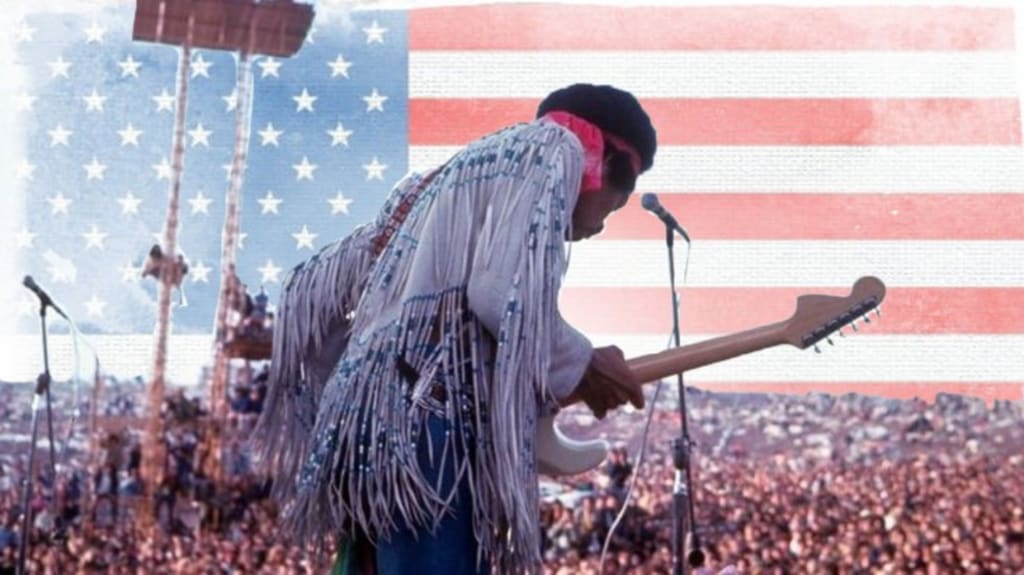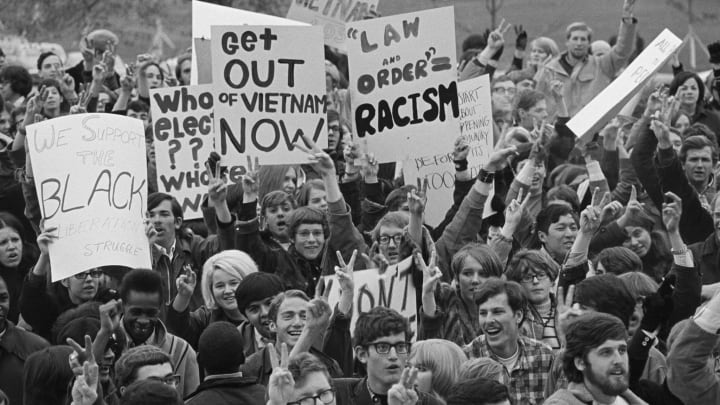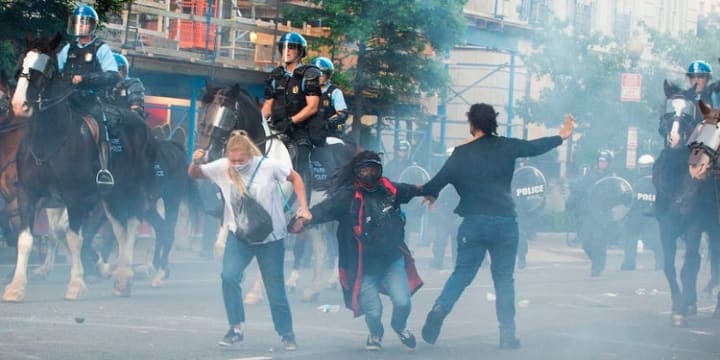Jimi Hendrix & a New National Anthem
How this iconic moment from Woodstock still resonates with our country over 50 years later.

I write this article the day before my country's birthday. With everything happening within our fifty states, I find it difficult to plan for tomorrow. Thinking about sparklers, frankfurters, fireworks and cheer makes me feel like I'm ignoring many elephants in the room. The 4th is the best holiday to celebrate outside, yet this year we need to stay home. Additionally, anti-racist protests demonstrate that while the Declaration calls for "certain unalienable rights," not everyone in this country enjoys those rights equally. How can we celebrate freedom in America when not everyone is truly free? I don't know about you, but it feels hypocritical to me.
This Independence Day is going to be far different from all that came before. Maybe it's not a bad thing. As Cassandra Clare writes, "growing up happens when you start having things you look back on and wish you could change." By addressing America's racist past and neglect for the wellbeing of others (I'm looking at you, Karens refusing to wear masks in public!), our nation has a shot at becoming more mature. After all, governments across the world have been around far longer than ours. The United States turns 243 this year. Compared to other countries, we're still a teenager.
I've been thinking about history more than usual. After all, those who do not learn history are doomed to repeat it. One time period in particular I've been looking back on is the 1960's. Last year, I attended a theatrical adaptation of Joan Didion's The White Album in New York City. It's a memoir which chronicles Didion's experience with some of the most iconic parts of the 60's. In a talkback after the show, an older woman who lived through the time period said there are many parallels in what's going on today. Anti-racist protests echo the Civil Rights Movement and repeal of Jim Crow Laws. The corruptness of Donald Trump is similar to Nixon's failures, and a preventable war against a virus has had more casualties than the unnecessary war raging at the time: Vietnam. To quote that woman in the theatre, "Like the 60's, everything is going on at once."

So if we're looking for an anthem perfect for 2020, look no further than music from the 60's. 1960's music reflected the chaos that was going on then, and I find it comforting in trying to understand what is happening now. The Rolling Stones have hits like Paint It, Black and Satisfaction which communicate frustration over artificiality and isolation in society. Aretha Franklin's Respect is an upbeat tune released during feminism's second wave, and is a powerful anthem for womxn. Although Creedance Clearwater Revival's Fortunate Son was made about Vietnam, it's a protest song relevant today because of its themes about the wealth gap in America.
But I don't think any artist in the 60's had music more thought-provoking than Jimi Hendrix's.
Considered the greatest guitarist in the world during his time, Jimi Hendrix left an astonishing musical legacy. After serving in the army until 1962, he played backup for musicians like Little Richard, B.B. King, Sam Cooke and the Isley Brothers. It wasn't until he moved to London Hendrix found independent success. He was the highest-paid musician at Woodstock and was inducted into the Rock & Roll Hall of Fame for his experimental work on the electric guitar. The Hall of Fame's biography for Hendrix states...
"Jimi Hendrix was arguably the greatest instrumentalist in the history of rock music. Hendrix expanded the range and vocabulary of the electric guitar into areas no musician had ever ventured before. His boundless drive, technical ability and creative application of such effects as wah-wah and distortion forever transformed the sound of rock and roll."
Music journalist Chuck Phillips also wrote,
"In a field almost exclusively populated by white musicians, Hendrix has served as a role model for a cadre of young black rockers. His achievement was to reclaim title to a musical form pioneered by black innovators like Little Richard and Chuck Berry in the 1950s."
Jimi Hendrix's professional career only lasted four years, but he will be remembered as a guitar god forever.
His music often talked about liberation. The song Freedom chronicled his relationship with Devon Wilson and trying to combat her heroin addiction. Originally I was going to use All Along the Watchtower for this article. It's an epic medley (and reinterpretation of Bob Dylan's version) that covers themes like class differences, government surveillance and incarceration, impending doom, and understanding pessimism as a form of maturity. It's a beautiful song, and if you haven't yet, please give it a listen.
But in thinking back to days in my high school's History of Rock N' Roll class, I realized there is one song of Hendrix's that will forever stand the test of time. It has been called "the single greatest moment of the 60's." Over 50 years later, it is still painfully relevant today. And with the holiday this weekend, I can't stop thinking about it.
That song is The Star Spangled Banner.
No lyrics. No flashy accompaniment. According to the bassist, the song wasn't even on the set list. It's just Jimi playing a legendary, electrifying guitar solo to an astonished crowd of 1969 Woodstock hippies.
This is my 2020 anthem. Rather, my 2020 national anthem.
Like many people when they first hear this rendition, I was confused by all the noise. I had no idea you could even make those sounds on guitar. Why did Jimi include copious amounts of feedback and distortion into a sacred United States song? Why was he playing The Star Spangled Banner in the first place? In giving the song a closer listen, I realized what he was doing. Jimi is mimicking the sounds of war on his electric guitar: bombs dropping, sirens blaring, machine guns rolling, and people crying.
Towards the end of the song, he strums the melody of Taps: the bugle call played at flag ceremonies and military funerals. All of these sounds were meant to emulate the sounds of the Vietnam War and protests on the streets during that time. The Star Spangled Banner itself is a song about war - with rockets' red glare and bombs bursting in air. Added war sounds are oddly appropriate.
I think the sounds still hold meaning in today's political climate. First, the sounds of bombs and gunshots are reminiscent of tear gas canisters and rubber bullets police have used against peaceful anti-racist protesters. This brutal use of force has shed a light on our country's glorification of militarization. Just like Vietnam, this force doesn't need to happen. Despite the First Amendment's "right of the people peaceably to assemble," law enforcement is preventing us from doing that.

The siren sounds from Jimi's solo can also be tied to police car sirens, as well as ambulance sirens. With coronavirus cases surging in the United States, many of those infected have needed hospitalization and help from respirators. I see Jimi's Taps solo as a tribute to the fallen essential workers on the front lines of fighting the virus. Just because they do not wield guns or bulletproof vests does not mean they are any less heroic than our United States military. They are saving lives, and we as a country must pay our respects.
Finally, the cries from Jimi's guitar can mean many things. They could be the cries of family members mourning the loss of loved ones from the virus. The cries of Black mothers and fathers mourning the deaths of their children at the hands of police brutality. The rallying cries of protesters on the streets. The cries of the young with tear gas stuck in their eyes. Our nation is collectively crying. We are screaming at the top of our lungs, trying to overcome the silence imposed on us by systemic racism, faulty politicians, and a respiratory virus. I believe history will not let our cries go unheard.
So with all this explanation, it begs the question...is Jimi Hendrix's version of The Star Spangled Banner a form of protest or patriotism? I think both ideologies are correct. During his Woodstock set, Hendrix made it clear he held no ill will towards the military or United States as a country. He dedicated his song Izabella to “maybe a soldier in the Army, singing’ about his old lady that he dreams about and humpin’ a machine gun instead.” Of course, Hendrix himself was an army vet. During his appearance on the Dick Cavett show, he said that his Star Spangled Banner wasn't unorthodox. "I thought it was beautiful. But there you go, you know?"
At a news conference held after Woodstock, Hendrix said, “We’re all Americans … it was like ‘Go, America!’ … We play it the way the air is in America today. The air is slightly static, see.”
The air is equally as static in the year 2020. Jimi's Star Spangled Banner can be compared to Colin Kaepernick's kneeling during the national anthem to oppose racial injustice. Some may claim it is anti-American, but ultimately, it is a tribute to Americans who have unjustly lost their lives. On kneeling, Chad Williams, the chairman of the Department of African and Afro-American Studies at Brandeis University, said it "is both an act of defiance and resistance, but also of reverence, of mourning, but also honoring lives lost. It is also simple and clear. Its simplicity gave it symbolic power, and as we see now, its power persists.” Of course, Williams is referring to protesters kneeling in remembrance of George Floyd.
Similarly, Hendrix's Star Spangled Banner contains this "defiance yet remembrance" Williams speaks of. Al Aronowitz of the New York Post wrote about Jimi's anthem, "You finally heard what the song was about. That you can love your country but hate the government." With what is going on in America now, I think it is important to keep Aronowitz's words in mind. Peaceful protest is essential for progress. We can love our beautiful country, but we must be conscience of the mistakes our nation has made. As a proponent of peace and love, Jimi Hendrix certainly knew the statement he was making when he played the national anthem on his electric guitar.
Despite its deep meaning, Jimi Hendrix's Star Spangled Banner gives me hope. He doesn't just end the song with the sound of bombs and crying - he finishes the original melody. It makes me realize we can strive towards a more perfect union during this ugly time in American history. We can be proud of where we live. We can overcome adversity. Still, we must learn from our past. I will be spending this Fourth of July weekend in revelry, yet remembrance. I hope all of you readers out there will be doing the same. xxx
_______________________________________________
AUTHOR'S NOTE
If you've read any of my recent articles, you know I've been donating all Vocal tips to the BLM Network. I encourage everyone reading this article to donate directly to the organization, but if you choose to tip me, please know that is where the money will be going. I also add $1 to every contribution made. (So if ten people donate, that's $10 from me.) From Vocal tips, I've been able to donate $60 to the network so far. Thank you for your contributions. I hope to write an article sometime soon about the experience.
I entered this challenge fairly early to get this up for Independence Day. Despite only one other article submitted so far, it is my pleasure to recommend Harley Quinn's world's article, "Experiments are good." First of all, I love Harley Quinn, Halsey, and anything related to them both. Second, it's a moxie-filled article about being comfortable with your own identity. Harley Quinn's world talks candidly about the experience of being a trans woman, and bravely avoids sugarcoating anything. I hope to read more of her articles.
Finally, I know Hendrix's Star Spangled Banner is an unusual choice for this challenge. There are no lyrics to dissect. It is more of a political statement than an uplifting tune. Still, I hope it resonates with you, dear reader, and you are able to see the art inside the notes. This is not just my anthem for Independence Day, but for the rest of 2020.
Peace, love, and happy 4th. ☮
-Katy
_______________________________________________
SOURCES:
- The Significance of Jimi Hendrix's "Star-Spangled Banner" - Youtube
- Patriotism or protest? Army vet Jimi Hendrix had the 'most electrifying moment' at Woodstock - Sean Moores, stripes.com
- Kneeling, Fiercely Debated in the N.F.L., Resonates in Protests - Kurt Streeter, The New York Times
About the Creator
Kathryn Milewski
Insta: @katyisaladybug
Also a blogger at Live365.com
Playlists, memoirs, and other wacky pieces.







Comments
There are no comments for this story
Be the first to respond and start the conversation.